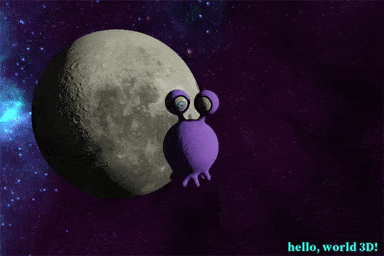INTRODUCTION
Jupylet is a Python library for programming 2D and 3D games, graphics, music and sound synthesizers, interactively in a Jupyter notebook. It is intended for three types of audiences:
Computer scientists, researchers, and students of deep reinforcement learning.
Musicians interested in sound synthesis and live music coding.
Kids and their parents interested in learning to program.


Jupylet for Kids
A Jupyter notebook is in essence a laboratory for programming. It is the ideal environment for playing around with code, experimenting, and exploring ideas. It is used by professional machine learning scientists who come every day to play at work, so why not by kids?
Jupylet is wonderfully easy to use for creating simple 2D and 3D games and music interactively and experimentally. Change a variable or a function and see how the game is affected immediately while it is running. Let's get started!
Jupylet for Deep Reinforcement Learning
Jupylet makes it is super easy to create and modify environments in which to experiment with deep reinforcement learning algorithms and it includes the API to programmatically control multiple simultaneous games and render thousands of frames per second.
Consider for example the pong game included in this repository. With a few lines of code you can modify the colors of the game to experiment with transfer learning, or turn the game into 4-way pong with agents on all four sides of the game court to experiment with cooperation between multiple agents. And since you can modify the game interactively in Jupyter this process is not only easy but also fun.
See the Programming Graphics and the Reinforcement Learning chapters for more information.
Jupylet for Musicians
Jupylet imports ideas and methods from machine learning into the domain of sound synthesis to easily let you create sound synthesizers as wild as you can dream up - it includes impulse response reverb effects, colored noise generators, resonant filters with cutoff frequency sweeping, oscillators with LFO modulation, multi sampled instruments, and much more… And all of it in pure Python for you to modify and experiment with.
In addition Jupylet draws inspiration from the wonderful Sonic Pi and brings live loops and live music coding to Jupyter and Python. Hook up your MIDI keyboard and take off.
See the Programming Sound and Music and the Programming Synthesizers chapters for more information.